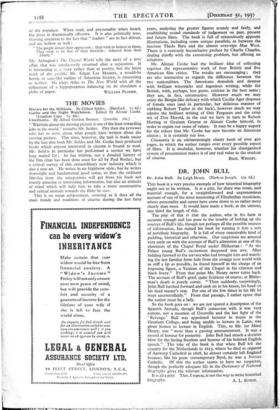THE MOVIES
Cinemania. By Alfred Gordon Bennett. (Jarrolds. i8s.)
" WRITING about the moving picture is one of the least rewarding jobs in the world," remarks Mr. Seldes. Pity then the reviewer who has to write about what people have written about the moving picture. This time, however, the task is made easier by the fact that both Mr. Seldes and Mr. Cooke have produced books which anyone interested in cinema is bound to read. Mr. Selths in particular has performed a service we have long waited for ; he has written, not a detailed history of the film (that has been done once for all by Paul Rotha), but a critical survey of this extraordinary new industry which is also a new art. He writes in no highbrow style, but he writes downright and fundamental good sense, so that the ordinary film-fan from the ninepennies will get from his book not merely amusing or interesting information, but also an attitude of mind which will help him to take a more constructive and critical attitude towards the films he sees.
This is no mean achievement, covering as it does all the main trends and traditions of cinema during the last forty years, analysing the greater figures acutely and fairly, and establishing sound standards of judgement on past, present and future films. The book is full of miraculously apposite illustrations, including some unique parallels, as between the luscious Theda Bara and the almost over-ripe Mae West. There is a curiously inconclusive preface by Charlie Chaplin, dealing chiefly with the censorship problem, but offering no solutions.
Mr. Alistair Cooke had the brilliant idea of collecting together the representative work of four British and five American film critics. The results are encouraging ; they are also instructive as regards the difference between the two nationalities. The Americans demolish and destroy with brilliant wisecracks and ingenious writing, while the British, with, perhaps, less gusto, criticise in the best sense ; they are, in fact, constructive. However much we may enjoy the Borgia-like delicacy with which Cecilia Ager disposes of female stars (and in particular, her delicious manner of stabbing Robert Taylor in the back), however much we may admire the brilliant writing of Otis Ferguson and the crisp wit of Don Herold, in the end we have to turn to Robert Herring or Graham Greene or Alistair Cooke himself, in order to regain our sense of values. It may be a happy augury for the others that Mr. Cooke has now become an American citizen ; it is certainly our loss.
Cinemania is an embarrassingly chatty book of over 400 pages, in which the author ranges over every possible aspect of films. It is doubtful, however, whether his disorganised system of presentation makes it of any real value to the student
































 Previous page
Previous page